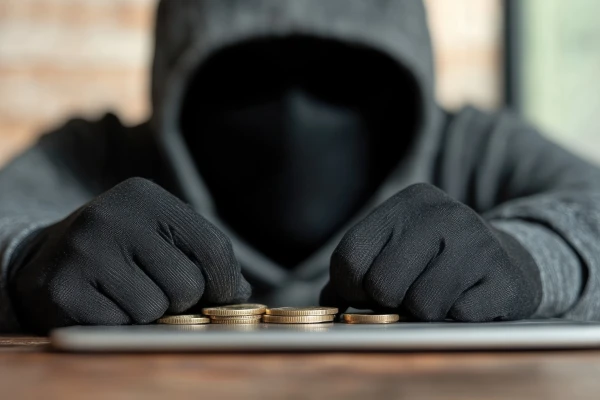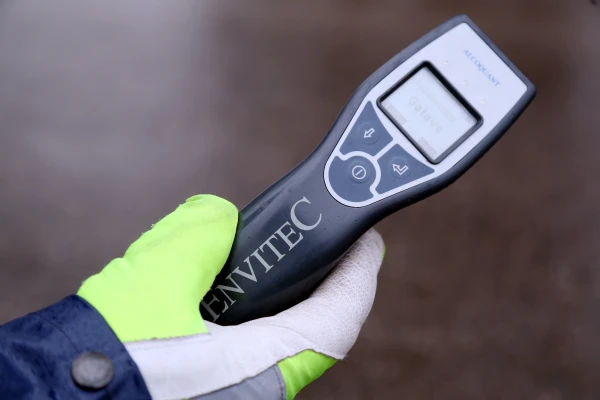
Recently, I found a notification in my email. The sender was the State Revenue Service. There could not have been any violations, but who knows, maybe I missed something?
In a strict and categorical tone, I was instructed to visit the specified website and act according to the instructions I would find there. Surprised that in this case, a government agency was reaching out in an unusual way (through the EDS system), rather than directly, I read the received message carefully again.
Unfortunately for the senders: they sent the message to a philologist who deals with two languages daily. Upon closer examination of the text, grammatical and stylistic blunders caught my eye one after another, which no official structure would ever allow under any circumstances. A call to the SRS support line confirmed my suspicion: an attempted fraud.
The 'Heirs' of Ostap Bender
Despite the multitude of warnings, the problem of fraud in Latvia remains relevant. The State Police regularly receives information about various cases and types of fraud — both old and newly invented. The scale is impressive: at the beginning of November, 229 cases were registered in just one week. In 153 of them, the attempts at fraud were unsuccessful; however, in 76 cases, people, mostly elderly, still lost their money. The total damage amounted to about 622,382 euros.
Among the methods used by fraudsters, phishing still leads — that is, when fraudsters randomly call people, posing as employees of utility companies, mobile operators, the State Police, the State Revenue Service, credit organizations, etc.
The creative imagination of the crooks is inexhaustible: they literally burst forth with ideas, inventing new and new 'traps' for their potential victims. In the police, as statements come in, information about the 'traps' is collected, systematized, investigated, and the public is informed whenever possible — on how not to fall into the clutches of fraudsters.
A Call from the 'Bank' or 'Broker'
Situation
Someone calls, introducing themselves as a bank employee or financial consultant. They report problems with your account or the opportunity to earn on investments. They ask you to transfer money to a 'safe account' or to provide Smart-ID codes.
Characters used by fraudsters: police officer, bank employee, telecom operator, financial specialist.
What Should Raise Suspicion:
• The call is made from an unfamiliar number, often foreign.
• The conversation is predominantly in Russian, less frequently in Latvian.
• They rush you, demanding an urgent decision (otherwise 'your account will be immediately blocked').
• They ask for passwords or authorization codes.
Tips
• Remember: neither the bank nor the police ever ask for codes over the phone!
• After ending the call, be sure to call the official phone number of the agency your recent interlocutor claimed to represent and check if they were a fraudster.
• Never transfer money to so-called 'safe accounts'!
• Under no circumstances should you rush or panic! Stop, think, engage critical thinking, call relatives or acquaintances who may understand these matters better than you. Your haste and panic are the best helpers for fraudsters!
Fraud in the Name of Relatives / Accident
Situation
A fraudster calls or sends a message claiming that your relative has been in an accident and has sustained serious injuries, or has simply been hospitalized, and therefore needs to obtain a certain amount (quite a large one) and either transfer it to a specified account or hand it over in cash to a courier who will soon arrive for the money.
What Should Raise Suspicion
-
The call or message comes from an unfamiliar number, the caller's tone is very emotional, infecting with their panic.
-
The demand to transfer money or hand it over to the courier is URGENT.
-
It is impossible to contact the relative directly, or during the conversation, it is impossible to establish whether it is indeed about a specific relative in trouble.
Tips
-
Never transfer money without speaking to the relative IN PERSON. Verify the information: call the victim or family members.
-
Engage critical thinking and ask yourself: would medical workers or police officers communicate with you in this way and suggest you take such actions?
-
Never send cash with strangers or payments to unfamiliar accounts.
Invoice Fraud
Situation
You receive an 'urgent' email with a fake invoice or payment request visually similar to a genuine one that could have come from a business partner or service provider. Naturally, the bank account there is 'slightly' altered; without checking the correctness of the account in haste, you easily send money to the fraudster.
What Should Raise Suspicion
• The invoice comes from a different email address or domain with a small error.
• The account number differs from the usual one.
• There is a demand for immediate payment, threats in case of late payment.
• No contact person is indicated, or some general information is provided.
Tips
• Verify the specified account number against previous ones.
• Call the official phone number of the sender and confirm whether they actually sent this email.
• If a legal entity — create an internal payment confirmation procedure in the company ('four eyes principle').
• Never pay a new invoice until the information contained in the invoice has been reliably verified.
Email Fraud
Situation
Fraudsters send out mass emails resembling notifications from banks, postal operators, or other institutions. The text contains a link to a fake website visually identical to the official one. The goal is to make the potential victim enter passwords, card numbers, or Smart-ID codes.
What Should Raise Suspicion
-
Threats in the style of: 'Your account will be blocked within 24 hours.'
-
The link address is visually similar but inaccurate (for example, swedbnk.com instead of swedbank.lv).
-
The text contains language errors or automatic translations.
-
The text contains a request to enter a password, PIN code, Smart-ID data, or electronic signature.
Tips
-
Never click on suspicious links!
-
Open the bank or service page, enter the address yourself!
-
Remember: banks and other institutions never ask for access data via email!
Fake 'Utility Workers'
One of the most common schemes actively used by fraudsters lately is a call from a 'utility service provider'.
Situation
The potential victim is informed that their meter needs to be replaced, 'clarifying' their residence, personal data, including asking for passport details.
Soon after, the person receives another call — this time introducing themselves as a police or bank employee; during the conversation, they inform the person that the previous call was from fraudsters, ask if there is cash at home, and if so — that it needs to be declared. Sometimes they even threaten with a search if cooperation is refused.
In the end, they inform that to protect their money, it should be handed over to a courier who will come for it. When the 'processed' victim agrees to hand over the money 'for safekeeping', a courier soon appears: arrives, takes cash and bank cards with all access data, and leaves.
Tips
-
Do not discuss personal information over the phone, especially with strangers!
-
End the conversation abruptly if the call seems suspicious to you.
-
Call the contact number of the utility service and check if its representative really called you.
-
Do not trust the 'second call'.
-
Never hand over money to a courier. The police/bank will never send employees for money!
We Are from 'GaZo'!
Recently, there have been increased cases where fraudsters pose as utility service employees. One of the most common 'disguises' is a 'Latvijas Gāze' employee.
Situation
The fraudster poses as an employee of 'Latvijas gāze' and under a plausible pretext (for example, to check the meter readings) tries to enter private property to commit theft or even robbery.
What Should Raise Suspicion
-
The employee did not arrange a visit time in advance.
-
They are unwilling to show identification.
-
They rush the potential victim ('let's hurry, I have a lot of calls to make' etc.).
Tips
-
Demand that the interlocutor present identification from GASO — only this organization has been the sole commercial entity in Latvia authorized to inspect natural gas distribution systems in households since December 1, 2017.
-
To ensure you are dealing with a GASO employee, call:
- on working days from 8:00 AM to 5:00 PM at 155,
- after 5:00 PM and on weekends — at 114;
- A sample of the GASO employee's identification and uniform can be viewed on the GASO website in the 'Know GASO' section: www.gaso.lv/atpazisti-gaso;
Fake Online Stores
Situation
You find the desired product online at a very low price. You pay for the product, after which the online store simply disappears. Naturally, you do not receive the desired item.
What Should Raise Suspicion
-
Suspiciously low prices.
-
Contacts or the store's registration number are unclear.
-
They ask for payment via bank transfer, not through a secure platform.
-
The store has recently opened or has no reviews.
Tips
-
Check reviews online.
-
Use a separate card for online purchases.
-
Carefully read the delivery and return conditions.
-
Pay for the product upon receipt or on a secure platform.
Ads Requiring an Advance Payment
Situation
A user on social media offers something valuable (an apartment, car, equipment, etc.) at a very advantageous price — but at the same time asks for an advance payment. After receiving the advance, they simply disappear.
What Should Raise Suspicion
-
The price is much lower than the market average / implausibly low.
-
The seller rushes for payment, demanding an advance before signing the contract.
-
They are located far away, and the product cannot be inspected.
Tips
-
Never make an advance payment if you have not seen the product in person.
-
Verify the seller's details.
-
Be critical or even skeptical of overly advantageous offers — remember where 'free cheese' is usually offered!
-
Use secure payment systems.
-
Never send money to personal accounts without being sure of the recipient!
Fake Lotteries and Prizes
Situation
You receive a cheerful message via email or phone about a large win — for example, 5,000 euros. However, to receive it, you need to pay a fee — 'for data processing' or some other ancillary service.
What Should Raise Suspicion
-
The message comes from an unknown source.
-
The prize is 'assigned' to you even though you did not participate in the lottery at all.
Tips
-
Remember that participants and winners in a real lottery are never asked to pay.
-
Never provide your banking details to strangers — even if they insist that they need to know in order to transfer money to you.
-
The most sensible thing in such situations is to delete the suspicious message.
Important to Remember
• Use strong and different passwords for each account.
• Do not use your data or the data of your relatives when creating a password.
• Enable two-factor authentication (for online banking, email).
• Regularly change passwords and do not repeat them across different services.
• Use a separate payment card for online purchases.
• Download and activate a DNS firewall on your mobile devices, created by CERT.LV together with NIC (the DNS firewall app will not only protect you from clicking on unwanted links but will also prevent receiving phone calls that CERT.LV has identified as fraudulent).
• Inform your parents, grandparents: elderly people become the most frequent victims of fraudsters. Stay in constant contact with them! And if they call you — consult with your more knowledgeable acquaintances or relatives about the next steps before taking any action!
• Never rush, especially if in doubt: stop, think, make sure — and don’t get caught!
















Leave a comment